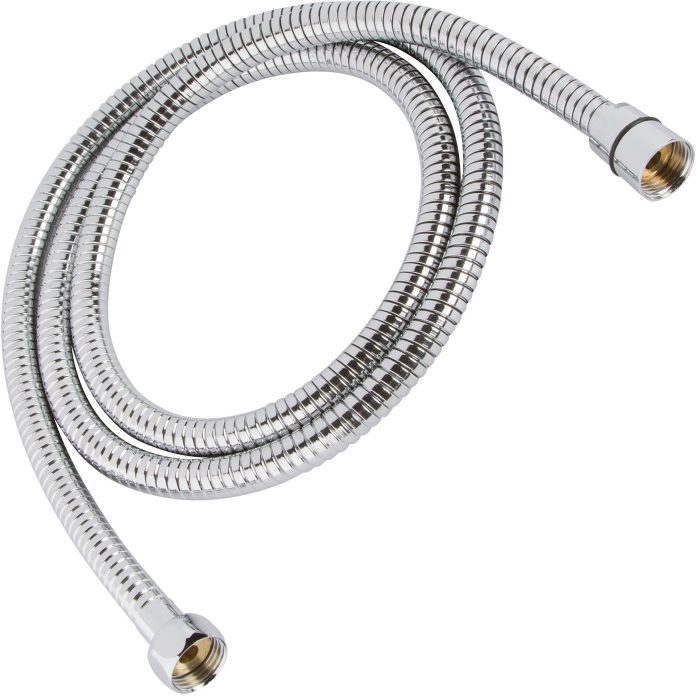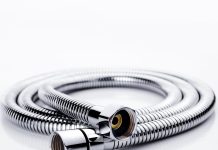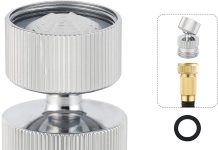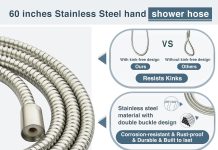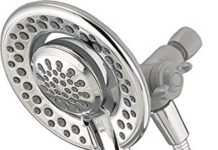Let’s talk about shower hoses! When choosing between an 8mm or a 10mm shower hose, it’s natural to wonder which option is better.
The size of the shower hose can have an impact on the water flow, durability, and overall showering experience.
This article will explore the differences between an 8mm and a 10mm shower hose, helping you make an informed decision that suits your preferences and needs. So, let’s dive in and find out which shower hose size reigns supreme!
Table of Contents
Durability
When choosing a shower hose, durability is an essential factor to consider. After all, we want a shower hose that can withstand the daily wear and tear of usage. The material and construction of the shower hose play a crucial role in determining its durability.
Material
The material used to construct a shower hose impacts its overall durability. Shower hoses are typically made from materials such as stainless steel or plastic. Stainless steel shower hoses are known to be more durable and long-lasting. They can withstand high water pressure and are resistant to rust and corrosion. On the other hand, plastic shower hoses may be more prone to wear and tear over time.
Construction
The construction of a shower hose also contributes to its durability. A well-constructed shower hose will have sturdy connectors and fittings, ensuring it remains secure and leak-free. Look for shower hoses with reinforced inner tubing and a solid outer layer. These features help to prevent kinks and damage, ensuring a longer lifespan for the hose.
Flexibility
Flexibility is another crucial aspect to consider when choosing a shower hose. A flexible hose allows easy use, making it easier to maneuver in the shower.
Ease of Use
An 8mm or 10mm shower hose offers ease of use. The smaller diameter of an 8mm shower hose provides increased flexibility, allowing for more effortless movement and maneuverability. On the other hand, a 10mm shower hose may offer slightly less flexibility due to its larger diameter but could provide a more robust water flow.
Bending Radius
The bending radius of a shower hose refers to how easily it can bend without kinking. A shower hose with a smaller bending radius is more flexible, allowing for easier installation and movement. Both 8mm and 10mm shower hoses can offer a good bending radius, but choosing one that meets your specific needs and preferences is essential.
Water Flow
Water flow is a critical factor to consider when selecting a shower hose. The pressure and volume of water that can pass through the hose determine the overall showering experience.
Pressure
The diameter of the shower hose can have an impact on the water pressure. A smaller diameter, such as an 8mm shower hose, may result in slightly higher water pressure. However, the overall water pressure will also depend on factors such as the showerhead and plumbing system. It’s essential to consider your specific water pressure needs and consult with a professional if necessary.
Volume
The diameter and length of the hose determine the water volume passing through the shower hose. Like a 10mm shower hose, a larger diameter can allow for a higher water volume. This can be beneficial if you prefer a solid and invigorating shower experience. However, remember that the shower hose’s length can also impact the water volume. Longer hoses may experience a slight decrease in water volume due to friction.
Installation
The installation process of a shower hose should be straightforward and hassle-free. Consider the compatibility, ease of installation, and fittings when choosing a shower hose.
Compatibility
Check the compatibility of the shower hose with your existing shower system. Ensure that the hose’s connectors and fittings match that of your showerhead and faucet. This will ensure a seamless installation without the need for any additional adapters or modifications.
Ease
A shower hose should be easy to install, even for those without plumbing experience. Look for hoses with clear instructions and user-friendly installation processes. Flexible and lightweight hoses are generally easier to handle and install.
Fittings
The quality of the fittings on a shower hose is vital for a secure and leak-free installation. Look for shower hoses with durable and well-constructed fittings that can withstand regular use without loosening or leaking. Consider hoses with brass fittings, as they are known to be more durable than plastic ones.
Appearance
While the functionality of a shower hose is crucial, its appearance also plays a role in the overall aesthetic of your bathroom.
Size
The size of a shower hose can impact its appearance. 8mm and 10mm shower hoses are commonly used and may come in various lengths to suit different needs. Consider the size of your shower and the overall visual aesthetic you want to achieve when selecting the hose size.
Aesthetics
The aesthetics of a shower hose can vary depending on the material and design. Stainless steel shower hoses often have a sleek and modern appearance, while plastic hoses may offer more flexibility in colors and patterns. Choose a shower hose that complements your bathroom’s overall style and design.
Price
Price is an essential consideration for many when choosing a shower hose. The cost of a shower hose can vary depending on factors such as the material, construction, and brand.
When comparing prices, it is crucial to consider the durability and features offered by the hose. While a cheaper hose may save you money initially, it may not last as long or offer the same level of performance as a more expensive, higher-quality option. Assess your budget and choose a shower hose that provides the best value for your investment.
Maintenance
Proper maintenance of a shower hose is essential to ensure its longevity and optimal performance. Consider how easy it is to clean and what preventive measures you can take to avoid damage.
Cleaning
Regular cleaning of your shower hose is essential to prevent the buildup of mold, mildew, and mineral deposits. Look for shower hoses that are easy to clean with simple soap and water. Choosing a hose with an antimicrobial coating can also help inhibit the growth of bacteria.
Damage Prevention
To prevent damage to your shower hose, avoid excessive tugging or pulling, as this can cause strain on the connectors and fittings. Properly secure the hose to the showerhead and faucet to prevent unnecessary stress. If you live in an area with hard water, consider installing a water softener or using a water filter to minimize mineral buildup that can clog the hose.
Safety
Safety is a paramount concern regarding any plumbing fixture, including a shower hose. Consider bursting and temperature resistance to ensure a safe showering experience.
Bursting
Choose a shower hose designed to withstand high water pressure and is less prone to bursting. Look for hoses with reinforced inner tubing and robust construction to minimize the risk of bursting, which can result in water damage and potential injuries.
Temperature Resistance
A shower hose should withstand and safely handle both hot and cold water temperatures. Look for hoses that are rated explicitly for temperature resistance to ensure they can handle the temperature range of your shower system without cracking or melting.
Noise Reduction
Some shower hoses are designed to reduce noise by incorporating features that minimize water hammer or vibrations. Consider this aspect if you prefer a quieter showering experience.
Special Features
Shower hoses with special features can offer added convenience and functionality.
Anti-twist
An anti-twist feature can prevent the shower hose from tangling and twisting, making it easier to handle and use. Look for hoses with specially designed connectors or inner tubing that reduce twisting.
Anti-kink
An anti-kink feature prevents the shower hose from forming kinks, ensuring a continuous and steady water flow. Look for hoses with flexible construction and reinforced materials to minimize the risk of kinks and tangles.
In conclusion, when choosing between an 8mm or 10mm shower hose, consider factors such as durability, flexibility, water flow, installation, appearance, price, maintenance, safety, noise reduction, and unique features.
Assessing your specific needs and preferences will help you decide which shower hose is better suited for you. Remember to prioritize durability, ease of use, and compatibility with your existing shower system.
By considering all these factors, you can select a shower hose that enhances your showering experience and suits your style.

